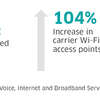One of the things that will characterize 2015 is the trend that started picking up momentum in 2014 that communications service providers (CSPs) have developed a sense of urgency about transforming their networks. It used to be that if you were a network operator you could invest with some level of assurance that the hardware and the associated software to run it would be core to your network for possible decades before becoming obsolete. However, as everyone in the industry knows, this is no longer the case.
As the world becomes more software-centric in terms of service creation, delivery, agility, security and performance— to meet the tsunami of data heading operator’s way and to allow network operators to maintain their relevance as ecosystem hubs rather than “dumb pipe” providers—cost efficient and effective operational excellence and the need to be fast-to-market and fast in the market with innovative services and enhanced customer experiences have become paramount. It is why so much attention is being paid to thing like Software-Defined Networks (SDN) and Network Functions Virtualization (VFV).
The need for speed has become (pardon the turn of phrase) hyper-critical. However, with recognition of the need to transform and do so rapidly should also come the recognition that network operators cannot transform rapidly and successfully on their own. It may not “take a village” to get transformations in the fast lane and done right, but it certainly takes trusted partners. In fact, Olivier Gueret , Senior Marketing Manager Wireless Transmission at Alcatel-Lucent, in a recent TechZine article, Rely on partners for your network transformation, makes a nice case as to the vital role partners can play in helping develop and expedite successful network transformations.
In fact, Gueret explains why professional services in particular are important in network transformation projects for a variety of reasons including filling in skills gaps and having experience in all of the complexities of such projects. After all, network transformations from my own observations are like trying to change jet engines while a plane is at 30,000 feet. They are extremely complicated, especially since every customer is unique, and the plane needs to stay in the air and perform at optimal levels even as parts are replaced. There is also interesting challenges regarding the costs of change and how to quantify that the ends justify the means.
Gueret in his posting posits the case made above, i.e., network transformation is no longer a nicety it is a necessity. He goes on to highlight that this really is a case of different strokes for different folks. In fact, he points to a recent Ovum study that when it comes to the reasons to transform operators are divided in two camps:
- Operators adopting an offensive position invest to generate new revenues (with OPEX increase)
- Operators in defensive position respond to revenue decline by lowering their OPEX
As he notes, both approaches have the same goals of transforming their network to increase revenues and reduce OPEX, they certainly diverge as to how. This leads to falling into some traps which reliance on a trusted partner with deep network transformation expertise can help mitigate.
Gueret points out the hidden costs of “home-made” network transformations which can translate into additional costs. Cited additional costs from going it by yourself if you are an operator include: costs of unexpected delays caused by poor planning and sequencing; costs from poor quality assessments of infrastructure capabilities; and costs from over-dimensioning, .e.g., spending on things that will not be used or cannot be optimized.
The case for relying on a trusted partner
As Gueret details, the case for relying on a trusted professional services partner is a compelling one. He notes that such a partner, “Can define, plan and execute a transformation efficiently, even if most operators have in-house competencies to do it themselves.”
The benefits he cites are:
- It is faster – A partner has done it before, and has the tools and methodologies already in place. The operator can therefore benefit from best practices.
- It is simpler – The partner often proposes a fully bundled project covering a variety of profiles but with a single point of contact.
- It is better - The partner’s expertise allows the operator to avoid common traps and reduce risk. The operator can also benefit from the latest innovations in terms of tooling with embedded engineering expertise.
- It is cheaper – The project cost is known in advance. There are no hidden costs and on-time delivery is guaranteed.
The article goes on to point out how professional services are part of a broader set of capabilities for upgrading network infrastructure, and that partnering on a variety of fronts can enable operators, regardless of where they are coming from, to shift their business models. This means relying on a variety of trusted partners to not only to prepare and execute their network transformation but also to manage and maintain their networks.
This would let operators shift their business model to focus on their core activity: managing their commercial offers and their customers. This is a reality that is summed up well in the chart below from the posting.
Figure 3. Enabling operators focus on customer facing activities
The message is a powerful one. The urgency is there for operators to transform their networks for a host of well known reasons relating to operations costs and competitive necessities, and despite a cultural history to do almost everything themselves, network operators by relying on the expertise of others have the opportunity to meet their cost objectives and concentrate on what they do best. This means not just listening to the voice of the customer but hearing them and reacting quickly in ways that encourage loyalty and the willingness to trust the operator when evaluating the purchase of new products and services.












